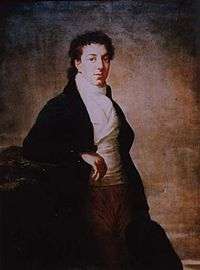William Pleydell-Bouverie, 3rd Earl of Radnor

William Pleydell-Bouverie, 3rd Earl of Radnor (11 May 1779 – 9 April 1869), styled Viscount Folkestone until 1828, was the son of Jacob Pleydell-Bouverie, 2nd Earl of Radnor and Hon. Anne Duncombe.[1]
He first entered the House of Commons for Downton upon reaching his majority in 1801, switching to Salisbury in 1802. He was appointed a deputy lieutenant of Berkshire on 22 November 1801.[1]
He married, firstly, Lady Catherine Pelham-Clinton (d. 17 May 1804), daughter of Henry Pelham-Clinton, Earl of Lincoln, on 2 October 1801[1] and had two children:
- Lady Catherine Pleydell-Bouverie (8 July 1801 – 21 February 1875), married Edward Pery Buckley
- a stillborn daughter (2 May 1804)
On 31 March 1803, he was commissioned a captain in the Berkshire Regiment of Militia, and a captain in the Berkshire Yeomanry on 14 March 1805. From 9 December 1812 to August 1817, he was lieutenant-colonel of the Berkshire Regiment of Militia.[1]
He married, secondly, Judith Anne St John-Mildmay, daughter of Sir Henry St John-Mildmay, 3rd Baronet on 24 May 1814[1] and had six children:
- Jacob Pleydell-Bouverie, 4th Earl of Radnor (18 September 1815 – 11 March 1889)
- Hon. Ann Maria Pleydell-Bouverie (16 January 1817 – 18 July 1825)
- Rt. Hon. Edward Pleydell-Bouverie (26 April 1818 – 16 December 1889)
- Lady Jane Harriet Pleydell-Bouverie (April 1819 – 7 June 1903), married William Ellice
- Lady Mary Pleydell-Bouverie (22 December 1825 – 24 October 1900), married James Wilde, 1st Baron Penzance
- a stillborn son (26 June 1832)
On 27 January 1828, he succeeded his father as Earl of Radnor, and on 9 February 1828 as Recorder of Salisbury. Radnor was made a deputy lieutenant of Wiltshire on 9 August 1839 and a vice-lieutenant of the county on 17 August 1839.[1]
In 1828, he built a toll road providing an easy route between Folkestone harbour and Sandgate. The original toll house remains within the Lower Leas Coastal Park. Either side of the toll road, land was cultivated and grazed. Old field boundaries are still used in the park, and the 'Cow Path' is a reminder of the drove route from The Leas.[2]
Radnor served as governor of the French Hospital at the time of its move from Finsbury to the new and imposing hospital building in Victoria Park, Hackney, designed by Robert Lewis Roumieu. Successive Earls of Radnor were governors of the hospital from the eighteenth century to 2015.[3]
References
- 1 2 3 4 5 6 Doyle, James William Edmund (1886). The Official Baronage of England, v. 3. London: Longmans, Green. pp. 96–97.
- ↑ "The Lower Leas Coastal Park" (PDF). www.shepway.gov.uk. 19 April 2012. Retrieved 22 December 2013.
- ↑ Tessa Murdoch and Randolph Vigne with foreword by Jacob Pleydell-Bouverie, 8th Earl of Radnor, The French Hospital in England: Its Huguenot History and Collections Cambridge: John Adamson ISBN 978-0-9524322-7-2 OCLC 318092110.
External links
- Hansard 1803–2005: contributions in Parliament by the Earl of Radnor
| Parliament of the United Kingdom | ||
|---|---|---|
| Preceded by Sir William Scott Hon. Edward Bouverie |
Member of Parliament for Downton 1801–1802 With: Hon. Edward Bouverie |
Succeeded by Hon. Edward Bouverie Hon. John Ward |
| Preceded by Hon. William Henry Bouverie William Hussey |
Member of Parliament for Salisbury 1802–1828 With: William Hussey 1802–1813 George Purefoy-Jervoise 1813–1818 Wadham Wyndham 1818–1828 |
Succeeded by Wadham Wyndham Hon. Duncombe Pleydell-Bouverie |
| Preceded by Sir Thomas Brooke-Pechell Edward Golding |
Member of Parliament for Downton 1818–1819 With: Sir William Scott |
Succeeded by Hon. Bartholomew Bouverie Sir Thomas Brooke-Pechell |
| Peerage of Great Britain | ||
| Preceded by Jacob Bouverie |
Earl of Radnor 1828–1869 |
Succeeded by Jacob Pleydell-Bouverie |